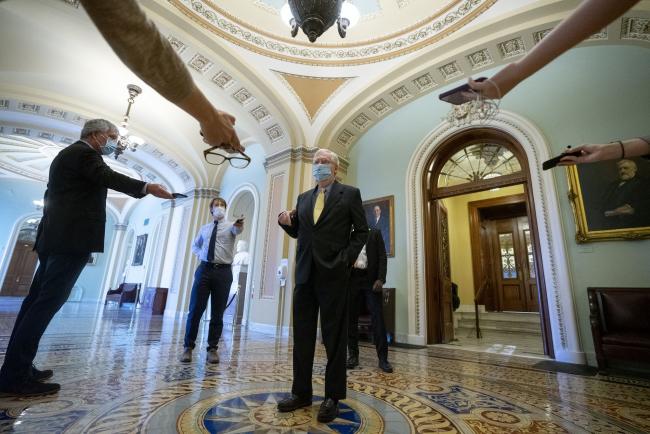This post was originally published on this site
https://d1-invdn-com.akamaized.net/content/pic0d52d281aa0f3cfd3721379f477a7f4f.jpg
The four main principals — Treasury Secretary Steven Mnuchin, White House Chief of Staff Mark Meadows, Speaker Nancy Pelosi and Senate Minority Leader Chuck Schumer — haven’t talked since Friday. And Senate Majority Leader Mitch McConnell and Schumer continued to exchange rhetorical broadsides on the Senate floor Tuesday, without new ideas for a compromise.
The White House says Democrats must reduce demands for state and local aid and for $600 a week in unemployment relief to restart the talks. Democrats say the White House must agree to $1 trillion in spending beyond the $1 trillion it already put on the table.
President Donald Trump for the time being appears content to let his executive actions deferring payroll taxes and providing a $300 a week boost in unemployment aid to play out. With the stock market flirting with all-time highs, there’s no pressure on him from that quarter. The S&P 500 Index headed for an eighth straight day of gains Tuesday.
“It may take a catalyst like a slide in the stock market to generate the political will necessary to pass legislation,” said Mark Zandi, chief economist at Moody’s Analytics.
For the moment, Trump’s executive orders might have helped sentiment. But economists including Zandi have flagged their difficulty of implementing them, along with insufficient size.
“Even if they were magically fully implemented today, retroactive to the start of this month, they would provide only a $400 billion boost to the economy by year’s end,” Zandi said. That’s “well short of the $1.5 trillion I estimate is necessary to avoid backtracking into recession.”
Federal Reserve Bank of Richmond President Thomas Barkin said Tuesday that for the economy, Covid-19 threatened to become like a “sinkhole” in the road, which needs fiscal support to cover over. “If Congress takes away support too abruptly, you know what could happen to my metaphorical automobile.”
Nevertheless, some congressional staff are speculating that the political standoff could continue into September, when lawmakers will have to forge a consensus on how to keep the government running when the new fiscal year begins on Oct. 1.
Stopgap Spending
Neither side at this point is actively working on such a bill combining stimulus and agency funding. The fiscal 2021 appropriations process stalled in the Senate over the summer, when Democrats said they would attempt to add police reform and Covid relief riders to otherwise bipartisan funding bills. Republicans, fearing moderates in their caucus might peel off to back the moves, then suspended work on the 12 annual measures.
That means a stopgap spending bill to keep the government functioning beyond Oct. 1 is all but assured — offering a hard deadline for action on stimulus.
Pelosi on Sunday shot down the idea of combining virus relief and the appropriations process on Sunday, saying negotiators must get back to the table before then.
“Well, we have to. We have to,” Pelosi said during an appearance on CNN.
As of Tuesday afternoon, however, there still had been no direct communication between Pelosi and Mnuchin since Friday, according to an official familiar with the matter. Other congressional officials on both sides of the political aisle also said there had been no contact between her and McConnell, although they were holding out hope talks might be rejuvenated this week.
Perception War
Both the Republicans and Democrats are trying to win the perception war, and appear as having done more to compromise with an unreasonable partner.
McConnell has homed in on Democratic demands to reinstate state and local tax deductions that benefit wealthy homeowners in high-tax areas and to transfer some $915 billion to state and local governments.
“When the Speaker and the Democratic Leader say they will not allow another cent for schools to re-open or for the job-saving PPP unless they get a trillion dollars for a state and local slush fund that’s completely out of proportion to actual needs, they are playing hardball against children and parents,” McConnell argued on the Senate floor.
Democrats focus on the top-line level of spending, saying they were willing to shift from their $3.4 trillion House-passed proposal.
“Democrats offered to come down by $1 trillion. We asked our counterparts, Secretary Mnuchin, Mr. Meadows, to come up by $1 trillion. Meet us in the middle. They said no,” Schumer said Tuesday on the Senate floor.
“Facing the greatest domestic crisis of the 21st Century, where Americans are hurting health-wise and economically, the Senate Republican majority ran down the clock, tossed up an air ball, and then subbed themselves out of the game,” Schumer said.
©2020 Bloomberg L.P.

